- Home
- Deborah Smith
On Grandma's Porch Page 7
On Grandma's Porch Read online
Page 7
“Hi,” I said shyly. “Daddy’s getting the car.”
Mrs. Vines was just as shy with me.
“I told him I could walk, but he insisted,” she said, her voice soft and quiet.
“Oh Daddy would never let a lady in your condition walk,” I said without thinking.
Mrs. Vines smiled, covering her mouth as she did. I noticed that several of her teeth were missing and others were stained. I looked away, pretending I didn’t notice.
When we got to the Vines house, Mr. Vines was sitting in the driveway holding his arm. The wagon wheel was off, lying in the grass beside him and the children were cluttered about him. Daddy went to kneel beside him. The Vines kids stared at me and I stared back at them.
There were three boys and three girls; the oldest boy looked to be about twelve and there was probably two years’ difference between the rest on down the line.
“The boys here are Matthew, Mark and Luke and the girls there are Ruth and Rebecca and Baby—well, she don’t have a name yet. We just call her Baby.”
The tiny little girl looked to be about three years old. She was very frail and fragile-looking and so small that she looked like a doll. Her skin was pale, with no freckles like the other kids had. I guess they all saw me staring at her.
“She’s sick,” Matthew said. “She was born with something wrong with her heart.”
“Oh,” I said. “Is she okay?”
“She’s much better,” Mrs. Vines said. “Aren’t you, Baby?”
The little girl shook her head and put her thumb in her mouth.
“She don’t talk much,” Mrs. Vines said.
Baby had red hair like her mother and the rest were tow headed, though some had reddish highlights. They were skinny too, but not the same way that Baby was. Their clothes were threadbare and none of them wore shoes.
“What happened?” Daddy asked.
“The durned wheel come off on me,” Mr. Vines said. “Pinned me to the ground. The kids managed to get it off, but I think my arm is broke.” He was obviously in pain, but trying hard not to show it.
Mrs. Vines stood back, not saying much. I found that strange. If it had been my dad, my mother would have been on her knees beside him, fussing and trying to help. Mrs. Vines seemed completely at a loss, as if she had no idea what to do to help.
“Can you walk?” Daddy asked.
“I . . . I think so,” Mr. Vines replied. “If you can help me to my feet.” He looked very pale and when he stood up he wavered a bit, as if he might faint. The pain on his face as he cradled his arm made pains shoot down my chest.
“If we can get you in the car, I’ll drive you into town to the doctor.”
“Oh, no,” Mr. Vines said. “No need for that. If you’ll help me set it and put a splint on it, I’ll be fine. Can’t afford no doctor.”
“Lord, man,” Daddy said. “I’m not about to do that. Don’t worry about the doctor. I’ll take care of that.”
“I can’t let you do that.” Mr. Vines said, setting his mouth stubbornly. “Don’t accept charity.”
“Well, unless you want to wrestle me down, you don’t have any choice about it,” Daddy said, grinning.
I giggled, knowing how silly my Daddy could be. But neither Mr. Vines nor Mrs. Vines laughed. I supposed they didn’t understand Daddy’s sense of humor.
“Get in the car, Millie,” Daddy said. “I’ll drop you off at home on the way to the doctor.”
“Let her stay,” Mrs. Vines said. She reached out and touched my hair shyly. “I just made breakfast and the kids would love to have a new playmate.”
“I don’t know,” Daddy said. “Your mother—”
I knew what he was about to say. My mother would have a fit at the thought of me having breakfast with these poor mountain people.
“Please, Daddy,” I said.
“You sure?” he asked, looking at me oddly.
“Yes,” I said. “I’ll walk home later.”
“I’ll stop and tell your mother where you are then,” he said. But his look told me that I’d be the one to face the consequences when I got home.
After they left, Mrs. Vines gathered the children and we went into the house that I was so familiar with. This had always been a place of homecoming to me. My grandparents had made the old farmhouse into a warm and beautiful home. It was where we had always gathered for holidays and special occasions, and I was sad that all that was gone.
When I walked into the front hallway I was shocked.
There was nothing much in the house. No rugs on the floor, no pictures on the walls. Not really much furniture at all. In the living room were two beds, and I imagined that’s what most of the rooms were used for. Bedrooms for the large family.
But going into the kitchen I soon forgot about that. There was the most delicious smell of chocolate in the air. I imagined we would be having hot chocolate when Mrs. Vines seated us at the oil-cloth-covered table and began serving breakfast.
She placed a buttered biscuit on each plate, and then from a huge iron skillet she began to ladle a black syrupy mixture onto the biscuits. It smelled wonderful. Then she poured each of us a tall, cool, glass of sweet milk from a blue, earthenware pitcher.
“Chocolate?” I asked, staring at the syrup.
“Chocolate gravy,” Mrs. Vines said with a certain amount of pride. “Mr. Vines says I make the best chocolate gravy around.”
“Hum,” I said, tasting it gingerly. “Never had chocolate gravy before. Reckon I never even heard of it.”
“Never heard of chocolate gravy?” the kids yelled. They laughed and giggled as they ate, smearing chocolate all over their mouths.
It tasted as good as it smelled. And soon I was asking for seconds. My mother would have been horrified to know I also asked for thirds. Mrs. Vines beamed as she ladled more onto my plate. I loved chocolate and this was like manna from heaven.
When I got back home, Mama and Grandma asked so many questions it made my head spin. I answered as best I could about Mr. Vines’ arm and told them how nice Mrs. Vines was and how funny the children were. I told them about the little red-haired girl with no name.
“They just call her Baby,” I said. “And she’s probably two or three years old.”
“Poor little thing. They probably didn’t think she’d live,” Grandma said. “Used to, people didn’t name children when they were born with serious ailments.”
“But . . . she did live,” I said. “So she’ll be okay, won’t she?”
“We hope so, dear,” Mama said, giving Grandma a look.
“How does the old place look?” Grandma asked. I knew she changed subjects intentionally.
“Empty,” I said. “And kind of sad.”
“Oh, now—don’t let it made you sad, darlin’,” Grandma said. “Life goes on and we have no choice but to follow. I should have left some of the old things in the house for the renters.”
“Goodness, Maude,” Mama said. “You wouldn’t want to do that.”
“Why wouldn’t I? They need it and I’ve got it. Why not?”
“Your things were always so nice, that’s why.”
“Yes,” Grandma replied. “In later life we did manage to acquire some nice furniture. We had a nice home. But it wasn’t always that way. And I’d hate to think that people saw us in the same light as some people see the Vines family.”
“Oh piffle, Grandma,” Mama said. “That’s unlikely.”
“And why is it so unlikely?” Grandma asked, bristling.
I hated it when Mama and Grandma bickered.
“Mrs. Vines made the best breakfast I’ve ever had,” I said.
They both turned and looked at me, staring as if I’d lost my mind.
“What?” Mama asked.
�
�The best breakfast,” I repeated. “Chocolate gravy and buttered biscuits. Grandma, you know how to make chocolate gravy?”
“Chocolate gravy?!” The look on my mother’s face was one of horror. “On biscuits?”
I nodded my head.
“Why, I’ve never heard of such a thing,” she said.
“Now, Bess Rogers, don’t you go acting all uppity like you never heard of chocolate gravy,” Grandma said. “You know many a poor Southern family served their family chocolate gravy—sometimes every morning. It’s hot and filling and Lord knows with all that sugar it has plenty of energy for a growing child.”
Mama sniffed as if her feelings had been hurt.
“We certainly never ate chocolate gravy,” she said.
“I’m sure you didn’t, dear,” Grandma said dryly.
“It’s good,” I exclaimed.
Grandma laughed. “It is good,” she said. “I used to love it myself. But it’s been a long time since I’ve even thought about it.”
“I don’t know what your Daddy was thinking,” Mama said. “Letting you have breakfast with those people. Why you’re liable to be sick, eating chocolate for breakfast.”
“It would be worth it,” I said, remembering the delicious chocolate concoction.
“Millie Ann Rogers,” Mama said as if she meant business. “Don’t get sassy with me. You are not to eat anything ever again at the Vines’ house. Knowing your daddy, he’ll have you over there with him, but you don’t have to eat there.”
“But Mama . . . “ I complained.
“Don’t Mama me,” she said. “You just mind what I say unless you want to go outside and cut me a switch.”
“No, ma’am,” I said. “I mean yes, ma’am.”
I sighed as I left the room. There was just no talking to Mama when she made up her mind about something. She never seemed to like anyone I liked and she never wanted me to do anything fun!
Summer passed quickly and as Mama predicted I was at the Vines house often, always with Daddy. He helped Mr. Vines as much as he could, but by then summer was almost over. Their crops were meager and I often heard Daddy talk about what a hard time the family was having.
In the fall, Luke Vines was in my class. He was a quiet, polite boy but because of the poor way he dressed the other kids often made fun of him. None of the Vines children seemed to fit in at school.
One day when Luke was absent, our teacher, Mrs. Fitzgerald, took the opportunity to talk about him with our class.
“There is no shame in being poor,” she said. “Jesus was a poor carpenter. Would you make fun of him if he were in this class?”
“Noooo,” the class said in unison.
“A person can be poor, but as long as he’s clean and works hard, there’s nothing wrong with that—isn’t that right children?”
“Yes, Mrs. Fitzgerald,” we sang out.
“Now, when Luke comes back I expect things to be different. You children will treat him with respect. He doesn’t deserve to be treated badly for something he has no control over. Do you understand?”
“Yes, Mrs. Fitzgerald,” we said.
After school I’d go to Grandma’s room. We’d have a snack and sit and talk before I did my homework. That day I told her what Mrs. Fitzgerald had said about Luke.
“Mrs. Fitzgerald is a good woman,” Grand ma said. “And a fine teacher. I hope Luke will have an easier time when he gets back.”
I nodded. I felt so grown-up discussing such things with Grandma. In a time when children were supposed to be seen and not heard, my grandmother was very open and honest with me.
Autumn passed and the weather grew cold. I began to be excited about Christmas vacation. Christmas was always a happy time at our house and even though Grandpa would not be there that year, I was happy at least that Grandma was living with us. She enjoyed Christmas as much as I did—maybe that was why it had always been so special to my dad, because she had made their Christmases so much fun.
My dad made everything about Christmas fun, too. From going out to find a tree to finding just the right gifts. On Christmas morning my stocking, usually one of his old hunting socks, would be heavy with crisp apples, juicy oranges, nuts, hard candy and chocolate drops. And even though I’d always find the boxes of apples and oranges after Santa left I pretended that it was just a coincidence because I knew it pleased my dad.
As soon as Christmas vacation began that year Daddy started our search for just the perfect tree. The week before Christmas, Mama and Grandma began making cakes, pies and candy. We used hickory nuts in the fudge and for several nights we’d sit near the stove in the living room, picking out the delicate pieces of nutmeat to be stirred into Mama’s special fudge.
The weather had turned frigidly cold, but I didn’t mind. Our house was warm and cozy; we had plenty of food and it was the best time of the year. I didn’t know how anyone could ask for more than that. Except perhaps a white Christmas.
I remember vividly Daddy coming in on that Christmas Eve night. I was excited because we were going to church for the Christmas play and afterward all the children would receive bags of candy and fruit, and perhaps a small toy. The singing of Christmas carols made me feel warm and happy and I thought the holly wreaths and white candles in the windows were the most beautiful sight in the world.
As I was getting ready I heard Daddy talking to Grandma and Mama. Their words were low, but the tone sounded serious and it aroused my curiosity. I walked quietly to my door and listened.
“It’s been a tough year for them,” Daddy said. “Besides the fact that there wasn’t much money from crops, Mrs. Vines is having problems and has been ordered to stay in bed until the baby comes. The little girl—the one they call Baby—is very sick. The doctor says she might not live through the New Year.”
I felt an odd heaviness in my chest, and I felt like crying. I couldn’t believe it. I’d never known a child who died. All I could think of was Baby’s bright blue eyes and her shining red hair. She always seemed so sweet and happy.
“Oh, Clay,” Grandma said. “My heart aches for them.”
“What about Christmas?” Mama asked.
“Nothing,” Daddy said. It was unusual to hear such sadness in my daddy’s voice. “I should have checked on them sooner. There’s not enough money for food, much less toys for the children. And the house is cold. I told Mr. Romines to take them a truck load of firewood today.”
“Well, we must do something to help them,” Grandma said. “That’s all there is to it.”
“I have plenty of baked goods,” Mama said. “There’s enough to share.”
“I can give them one of the hams from the smokehouse,” Daddy said.
“We have plenty of eggs and I think we can spare some of the potatoes from the root cellar,” Mama said.
I smiled when I heard Mama. When it mattered she was just as generous as Daddy and Grandma.
Daddy looked at his watch. “Maybe I can get a few toys at the hardware store if I hurry, but everything else is closed by now. I’ll have to miss the church play,” he said, looking apologetically at Mama.
“It’s all right,” she said. “You go ahead. See what you can do about toys for those children. We’ll catch a ride with the neighbors.”
Daddy sighed.
“What’s wrong?” Mama asked. “Something else is bothering you—I can see it on your face.”
“It’s the little girl—Baby,” he said. “She said she only wants a doll with red hair for Christmas—one that looks like her.”
“Oh, Clay,” Mama murmured.
I thought Mama was going to cry and that wasn’t like her. I rarely saw her cry about anything.
Daddy rubbed his chin. “I doubt the hardware store will have any dolls. Do you think Millie has a doll she could give to the child?”
“You know,” Grandma said. “I think she might even have a doll with red hair—the one Santa brought her a few years ago. I could probably make a new dress for it from quilt scrapes.
I felt my heart lurch. Not Mandy, I thought to myself. She was my most favorite doll in the entire world. How could they expect me to give her away?
I slipped back into my room and quietly closed the door. I went immediately to the row of dolls sitting on the cedar chest and picked up the red haired doll. I was still standing there when Daddy came into the room.
“You heard?” he asked.
I nodded, not looking at him. I didn’t want him to see the tears in my eyes.
“Can’t I give Baby one of the other dolls?” I asked. “Mandy is my very favorite.”
“Why Millie, I’m surprised at you,” Daddy said. “This could be the last Christmas that little girl has. She’s not asking for much—just a doll with red hair. You have plenty of dolls.”
“I know,” I said, frowning. Still I didn’t let go of the doll.
I saw Daddy clench his teeth. I rarely saw that look on his face—one of anger and disappointment.
“You will give her the doll,” he said angrily. “We’re going out to the Vines place early tomorrow morning and take them Christmas and you will take the doll and give it to Baby.”
Holding the doll tightly to my chest I hurried past him and threw myself on the bed, crying. Daddy stood for a moment looking down at me—I could sense his anger. But what hurt worse was that I had disappointed him.
I couldn’t understand myself why I behaved as I did. Why was it so hard for me to give away a doll to a little girl who might be dying? Mama came in later and said we wouldn’t be going to the Christmas play because she and Grandma had decided to make doll clothes and prepare more food for the Vines family. I cried most of the night and the guilt I felt was something I’d never experienced in my young life.

 Legends
Legends Hold on Tight
Hold on Tight Just a Little Bit Guilty
Just a Little Bit Guilty The Beloved Woman
The Beloved Woman Alice At Heart
Alice At Heart Heart of the Dragon
Heart of the Dragon Critters of Mossy Creek
Critters of Mossy Creek Diary of a Radical Mermaid
Diary of a Radical Mermaid Caught by Surprise
Caught by Surprise Stranger in Camelot
Stranger in Camelot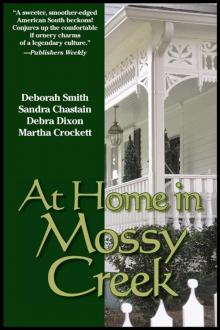 At Home in Mossy Creek
At Home in Mossy Creek Charming Grace
Charming Grace Blue Willow
Blue Willow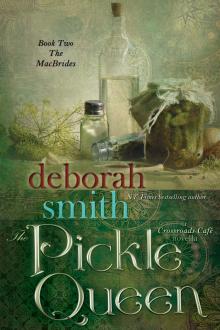 The Pickle Queen: A Crossroads Café Novella
The Pickle Queen: A Crossroads Café Novella On Bear Mountain
On Bear Mountain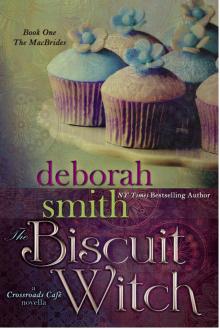 The Biscuit Witch
The Biscuit Witch Sara's Surprise
Sara's Surprise More Sweet Tea
More Sweet Tea The Apple Pie Knights
The Apple Pie Knights The Silver Fox and the Red-Hot Dove
The Silver Fox and the Red-Hot Dove Sweet Hush
Sweet Hush California Royale
California Royale Hot Touch
Hot Touch Miracle
Miracle The Stone Flower Garden
The Stone Flower Garden A Place to Call Home
A Place to Call Home Silk and Stone
Silk and Stone Honey and Smoke
Honey and Smoke Jed's Sweet Revenge
Jed's Sweet Revenge Silver Fox and Red Hot Dove
Silver Fox and Red Hot Dove The Kitchen Charmer
The Kitchen Charmer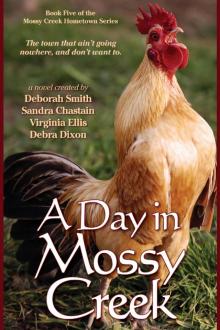 A Day in Mossy Creek
A Day in Mossy Creek Never Let Go
Never Let Go Summer in Mossy Creek
Summer in Mossy Creek On Grandma's Porch
On Grandma's Porch The Crossroads Cafe
The Crossroads Cafe Follow the Sun
Follow the Sun The Yarn Spinner
The Yarn Spinner A Gentle Rain
A Gentle Rain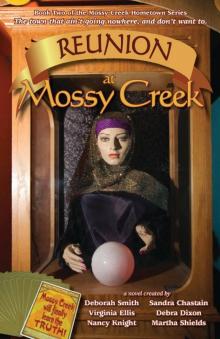 Reunion at Mossy Creek
Reunion at Mossy Creek